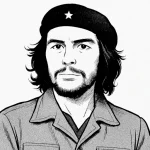“The guerrilla must move amongst the people as a fish swims in the sea.”

- December 26, 1893 – September 9, 1976
- Born in China
- Politician, thinker
table of contents
Quote
“The guerrilla must move amongst the people as a fish swims in the sea.”
Explanation
This quote emphasizes the fundamental principle that a guerrilla fighter must be deeply integrated with the people they are fighting for, just as a fish is naturally part of the sea. Mao Zedong viewed guerrilla warfare not just as a military strategy, but as an inseparable part of a broader revolutionary movement that depended on the support and participation of the people. For guerrillas to be successful, they must blend in with the population, gain the trust of the masses, and be able to move freely within their environment without being detected or isolated. This integration with the people ensures that the guerrilla force is not just an external military entity, but a part of the social fabric of the community, which provides the necessary intelligence, resources, and moral support for the struggle.
Mao’s insight was informed by his experiences in the Chinese Communist Revolution, where the Communist forces often fought in rural areas against a far stronger, more traditional military. The success of the Red Army was largely due to its ability to operate in rural communities, where the population was sympathetic to the Communist cause. Guerrilla fighters were able to gain and maintain this support by living among the people, understanding their needs, and positioning themselves as champions of the working class and peasants. This symbiotic relationship made the guerrillas not only difficult to defeat but also resilient and able to mobilize resources from the local population.
In the modern context, this quote highlights the importance of grassroots support in any movement, be it military or social. It underscores that sustained success depends not just on strategic warfare or political goals, but on gaining the trust and active participation of the people. In contemporary struggles—whether in social movements, protest movements, or political campaigns—leaders and organizers must ensure they remain rooted in the communities they serve, working closely with the public to understand their concerns and maintain their trust. This connection with the people creates the foundation for any long-term movement to thrive, just as the guerrilla fighter thrives by moving seamlessly among the masses.
Would you like to share your impressions or related stories about this quote in the comments section?

